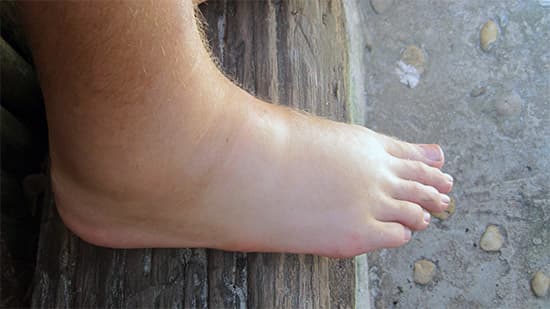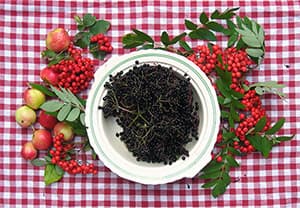Diuretics to effectively eliminate edema
Puffiness of any parts of the body indicates a malfunction of the internal organs or the system as a whole. With this disease, the appearance, blood circulation worsens, a lot of fluid accumulates, which negatively affects the functioning of the liver, kidneys and heart.
To determine the exact cause of edema, you should seek the advice of a doctor. The main reason may be the consumption of large amounts of liquid and junk food, that is, fatty, salty, fried and sweet.
Edema in the summer often occurs due to excessive consumption of water, drinks, juices and other liquids.
In winter, the factors for the formation of puffiness can be:
- cardiovascular diseases;
- pregnancy;
- phlebeurysm;
- diseases of the endocrine system;
- taking medications;
- poor functioning;
- various injuries;
Diuretics for various edema
Diuretics for edema are selected depending on the part of the body that has undergone the disease. Special treatment is used for swelling in pregnant women.
Puffiness of the face
Almost every person has experienced swelling of the face. This happens when the walls of the blood vessels are weakened and the pressure is increased. In this case, the liquid easily enters the tissue of the face, which causes swelling.

The process occurs in an accelerated mode due to the lack of clear partitions in the subcutaneous fatty tissue, as well as through age-related changes.
Puffiness can be either mild or severe (massive).
Causes of swelling of the face:
- local;
These are flux, conjunctivitis, burn, insect bite, skin inflammation, facial surgery
- general;
These include diseases of the kidneys, liver and cardiovascular system, excessive consumption of salt and alcohol, pregnancy, poor sleep, allergies, diabetes, hypertension, endocrine diseases.
Only a specialist can prescribe the right treatment. If the cause of the disease is an allergy, then it should be eliminated initially. But in severe cases, diuretics are also prescribed in combination with antiallergic drugs.
Common causes treated with diuretics include inflammation of the kidneys and congestion caused by heart disease.
With increased swelling of the face in the morning, you can talk about kidney disease, and in the evening about heart disease.
Choice of medicines
When choosing a diuretic, attention should be paid to its effectiveness and safety. The good effect of hyperthiazide and furosemide, which belong to the thiazide and loop groups of diuretics, has been proven.
However, with unsystematic use, malfunctions in the work of the heart, the appearance of seizures or osteoporosis are possible. Also, thiazide drugs can provoke an exacerbation of diabetes.
Therefore, it is better to consult a doctor for proper and safe treatment.
Swelling of the legs
Swelling of the legs occurs due to excessive fluid content in the tissues. The reason is disturbance in blood circulation, which supplies oxygen and nutrients to the tissue, and poor reabsorption.

Diuretics can help with this. However, before treatment, it is necessary to identify the factors that provoked edema.
It can be:
- phlebeurysm;
- heart or kidney failure;
- disturbed lymph flow;
- flat feet;
- work associated with constant long sitting or standing;
- lack of movement;
In the presence of one of the above diseases, the prescribed treatment will be complex.
Eye puffiness
Usually swelling of the eyelids occurs in the morning. The regular appearance of edema indicates poor kidney function.
There are many good diuretics out there. However, like all medicines, they have not only positive, but also negative properties. Therefore, before treatment, you should consult a specialist in order to avoid complications.
Consider the most used means:
- Veroshpiron.
Copes with minor swelling and swelling. It will take some time for it to take effect.
- Furosemide.
A fast-acting drug to eliminate even the most severe swelling of the eyes. It should be taken only in emergency situations, because it removes useful trace elements from the body, and this can lead to dehydration.
The course of the use of diuretics should not exceed 5 days. Otherwise, the work of the heart will be disrupted due to a lack of calcium in the body.
Also, the use of folk remedies is effective.
For this, a decoction is made from:
- field horsetail;
- wild rose;
- leaves of bearberry or orthosiphon;
It should be consumed half a glass of decoction 3 times a day.
After the course of treatment with diuretics, you should include in your diet foods such as baked potatoes, oranges, bananas and dairy products.
Puffiness during pregnancy
As a rule, after the sixth month of pregnancy, many women experience swelling of the legs. Sometimes swelling disappears on its own, but in some cases, treatment is required. After all, this can lead to varicose veins and complicate the work of the heart and kidneys.

Initially, you should review the foods used in the diet. If there is no improvement, diuretic treatment will be required.
During pregnancy, the following drugs are prescribed:
- Eufillin
It is a diuretic bronchodilator. Not recommended for low blood pressure, heart disease and epilepsy.
- Phytosilin
A natural diuretic that contains lovage and couch grass roots, parsley, horsetail, fenugreek seeds, birch leaves, hernia and goldenrod.
Relieves inflammation and swelling, does not contribute to addiction. The drug has a specific smell. Contraindicated in gastritis, hepatitis and acute nephritis.
- Kanefron
Natural remedy of rosehip, rosemary, lovage and centaury. It has antiseptic, antispasmodic and antibacterial action. Promotes the preservation of protein and potassium salts in the body.
Dangerous for the fetus is the use of:
- Ethacrynic acid- negatively affects the hearing organs;
- Veroshpiron- contributes to the occurrence of jaundice in a child and violates the blood formula;
- Triamterene- negatively affects the water-salt balance;
To eliminate edema during pregnancy, use and folk methods. You should carefully choose the method of treatment so as not to harm the child.
During pregnancy should not be used tincture of parsley, strawberry or juniper.
Better give preference the following diuretics: lovage, green tea, lingonberry or bearberry leaves, cranberry juice, fresh parsley, cucumber, beets and carrots.
Classification and action of diuretics
There are a lot of diuretics.
Their classification is based on:
- Efficiency. Distinguish powerful, moderate and weak.
- Origin. There are natural and synthetic.
- The mechanism of pharmacological action. Exists renal and extrarenal Group.
Some renal funds belong to loop diuretics. Renal drugs act on enzymes and help reduce the reabsorption of fluid and sodium into the kidneys.
Part extrarenal preparations include osmotic agents and those that form acids. Acid-forming agents promote the release of chloride ions, produce a good diuretic effect. Osmotic drugs act through the kidneys, thereby removing excess fluid.
- Chemical structure. it thiazide, mercury and derivatives diuretics.
The action of all diuretic drugs is aimed at removing excess fluid from the body.
Choice of funds
The choice of the necessary diuretics should be dealt with by the doctor. An independent decision can be erroneous and lead to a worsening of the disease. However, to control treatment, the patient must know how diuretics are selected.
The hospital will perform the necessary examination and assessment of the patient's condition. These drugs are used in acute and chronic pathologies.
Acute pathologies:
- allergy;
- stroke;
- swelling of the brain;
Treatment is with loop-acting diuretics. Apply ethacrynic acid and furomeside by injection and infusion. The use of drugs in the form of tablets is possible only when the patient's condition stabilizes. To eliminate cramps and improve the functioning of the muscles of the heart, potassium should be used.
Chronic:
- insufficiency of the liver and kidneys;
- diseases of the heart and blood vessels;
- hypertension;
For the treatment of such diseases, weak or medium-acting diuretics are used. In chronic heart failure, potassium-sparing drugs are used. They do not cause side effects, unlike potent drugs.
In diseases of the heart or kidneys, treatment based on herbal diuretics is effective. They have a bactericidal and tonic effect, and also removes toxins from the body.
Sometimes, for a better and faster effect, doctors immediately use a complex of diuretics.
Loop diuretics
It is these diuretics that are used most often. The positive point is the fast and powerful effect, and they do not contribute to high cholesterol. They take care of lowering blood pressure, relieve spasms, do not exacerbate diabetes.
These drugs include ethacrynic acid, torasemide and furosemide. However, these medicines can reduce the levels of magnesium, calcium, sodium, and potassium ions in the blood.
Therefore, to maintain the required amount of ions, asparkam or panangin should be used in combination with the above drugs.
Like most drugs, loop diuretics have side effects. There may be ringing in the ears, hearing loss, increased uric acid levels.
These drugs should not be used for frequent use. The duration of the effect is from 5 to 6 hours.
Potassium-sparing diuretics
These are diuretic drugs that have a weak or moderate effect.
They are suitable for people with cardiovascular diseases, as they regulate the right amount of potassium ions. They do not begin to act immediately, but only after 2-5 days.
Side effects are minimal and manifest as drowsiness, headache or abdominal pain.
Since potassium-sparing diuretics conserve potassium in the body, their use is not recommended for people with high potassium levels. Otherwise, hyperkalemia may occur.
Thiazide drugs
A fast-acting group of drugs, and the duration of their effect is from 10 to 12 hours.
Thiazide drugs do not affect the basic acid state. But they have a negative impact:
- increase glucose levels in diabetes mellitus;
- reduce the amount of potassium;
- retain uric acid;
- in rare cases, nausea, vomiting and diarrhea;
Less negative impact in preparations that contain natural ingredients:
- tea with bearberry and lingonberry;
- rosehip berries;
- preparations "Cyston" and "Canephron";
- field horsetail;
However, their frequent use can adversely affect the gastrointestinal tract and reduce potassium levels.
The use of traditional medicine
Folk remedies are very popular in the treatment of puffiness. They are safe and effective, but you should still consult your doctor before treatment.
Diuretics from berries and vegetables are affordable and effective. 
Consider the main traditional medicine recipes for the treatment of edema:
- You should use a mix of apple, viburnum, lemon and rowan juice. You can add a little honey for taste. And to improve the diuretic effect, parsley or birch extract is added, or 1 tsp. a spoonful of phytolysin.
- Bearberry decoction. You need to consume 1/3 cup at least 3 times a day.
- An infusion of parsley roots and leaves. The crushed plant is poured with boiling water for 8 hours. Then you should strain the infusion and add lemon juice. It should be consumed as follows: infusion is drunk for 3 days, and then 3 days of rest, etc.
- Decoction based on licorice root, juniper berries and pepper mountaineer. Crushed plant in the amount of 1 tablespoon should be poured with a glass of warm water for 8 hours. After the time has elapsed, the broth should be brought to a boil and boiled a little. You need to drink 1 glass any number of times a day.
- Fruit porridge made from apples, pumpkins and raisins.
You should grind 3 apples and 100gm pumpkin and some raisins. Mix everything thoroughly and send to the refrigerator. Consume 2 tablespoons before meals.
- Cucumber and celery.
Finely chopped or rubbed 1 cucumber and 3 pieces of celery. Water is added to the resulting mixture. You should drink 150 ml 4 times a day.
It should be remembered, no matter how many ways to treat puffiness, in any case, you must first consult a doctor. Only in this case you will achieve the desired result in the shortest possible time without harm to the body.




